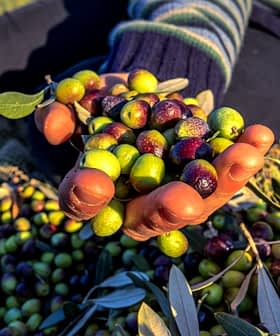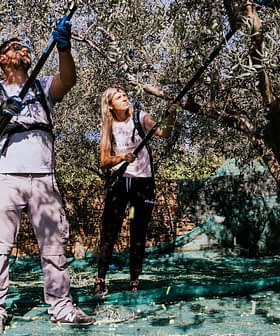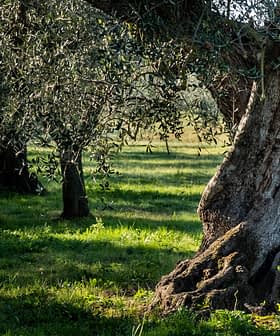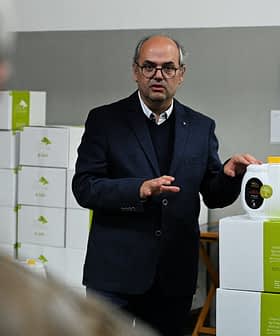Award-Winning Producer Sees a Bright Future for South African Olive Oils
After swapping grape vines for olive groves 20 years ago, the producers behind Mardouw Olive Estate are bullish about the future of olive oil in South Africa.
 Mardouw Olive Estate
Mardouw Olive Estate A series of triumphs at local and global olive oil quality competitions, including two Gold Awards at the 2022 NYIOOC World Olive Oil Competition, has bolstered Mardouw Olive Estate’s ambitions.
“Winning awards eased our ability to reach the national South African market through the major retailers of the country,” Philip King, Mardouw Olive Estate general manager, told Olive Oil Times. “Now we are actively exploring export opportunities.”
South Africa might have a small community of producers, but it is a community which works together.
Initially, the estate, located in the Western Cape province, was dedicated to wine-making. However, olive cultivation started to take root after the property changed hands in 2002.
“Thanks to the support of the agriscience faculty of Stellenbosch University, we were able to identify which olive tree cultivars were best suited for our climate,” King said.
See Also:Producer ProfilesThe climate in the Western Cape province, South Africa’s most southwestern province, is often described as a Mediterranean climate due to its hot, dry summers and cool, wet winters.
Additionally, the province boasts many different microclimates, primarily due to the influences of the Atlantic and Indian oceans, which meet on the province’s southern shores.
“This characteristic climate has led the vast majority of South African olive oil producers to establish their home here since several different olive cultivars thrive in these conditions,” King said.
Approximately 95 percent of the country’s producers are in the Western Cape.
Now, Mardouw’s agronomists grow widely known varieties such as Frantoio, Favolosa (Fs-17), Coratina, Nocellara, Mission and Kalamata. Overall, the estate is home to more than 50,0000 olive trees.
Soth African Olive Oils
South Africa’s olive oil industry has seen significant growth in recent years, with the country’s unique climate and soil conditions providing an ideal environment for olive cultivation. The industry has expanded rapidly since the 1990s, with the number of olive farms growing from just a handful to over 200 today. The majority of South Africa’s olive oil is produced in the Western Cape region, which is known for its Mediterranean-like climate. Many small-scale farmers have also entered the market, producing high-quality, artisanal olive oils. The industry has faced challenges in the form of drought and pests, but continued innovation and investment bode well for its future growth and success. Ten South African brands were awarded in the most recent NYIOOC World Olive Oil Competition.
“Our extra virgin olive oils tend to be robust products,” King said. “But we also produce an extra virgin olive oil halfway between delicate and medium.”
However, the subtle differences among Mardouw products, which are significant to olive oil enthusiasts and professional tasters, may sometimes be missed by the average South African consumer.
“The South African consumer, on average, is still highly uneducated about high-quality olive oil,” King said. “That is also why we constantly work to inform the consumer.”
King added that there had been some improvement in consumer awareness over the years. Still, the challenge for high-quality producers in the country remains in differentiating their products from cheaper, imported olive oils. King said this is crucial to set a fair price for South African producers.
“We go as far as putting the acidity levels of our extra virgin olive oils on our labels and keep reminding people always to verify that what they buy truly fulfills the minimum requirements for extra virgin olive oil,” King said.
As in many other markets, growing awareness about olive oil’s health benefits has been one of the driving factors behind improving quality. “There is still a lot of work to do,” King said.
King expects the harvest to begin this year in the first week of April. “That is when we plan to start the harvest,” he said. “From the first day, all the hand-picked olives are transformed with state-of-the-art technologies and stored in steel containers.”
Next, the estate’s expert blender evaluates the quality and the characteristics of each olive oil varietal. Based on this analysis, the company decides which blends it will make.
“While we work to obtain a product with certain characteristics, our blend will be different every year, based on how the season went,” King said.
It is still too early for Mardouw’s experts to estimate how the new crop year will be. “Summer at the moment is unfolding and is very hot; we even had a couple of days over 40 ºC,” King said.
While the country experienced drought for several years before 2020, the current season will unlikely be impacted by water scarcity.
In the high-density olive groves managed by the farm, fertilization and irrigation are of the utmost importance. However, during the recent drought, water availability for irrigation was consequently reduced. “Having sufficient water is probably our number one priority,” King said.
Last crop year, the farm had a bumper olive harvest, which resulted in a record olive oil yield. “We produced 55,000 liters of olive oil,” King said.
While there are no significant agronomic challenges, such as pathogens that might damage the trees or impact the yield, one of the keys to Mardouw’s quality is the constant monitoring of the trees.
“That allows us to promptly intervene whenever we see a tree is not faring as expected,” he said.
Given the high number of producers in the region, Mardouw Olive Estate and its peers collaborate for the harmonious development of the sector, which resulted in the creation of the South Africa Olive Industry Association.
“I think olive growing is the one industry where the producers tend to stick together,” King said. “We are governed by the association, of which I am also a board member.”
Activities carried on by the association and its members include training programs for growers. “We do workshops or seminars on the most relevant topics. Most growers will take a day or two off their work to be updated or to refresh notions on a specific matter,” King said.
He added that local producers collaborate for the common good, including tasting events and regular meetings where new ideas are shared.
“I think it is significant,” King concluded. “South Africa might have a small community of producers, but it is a community which works together.”









